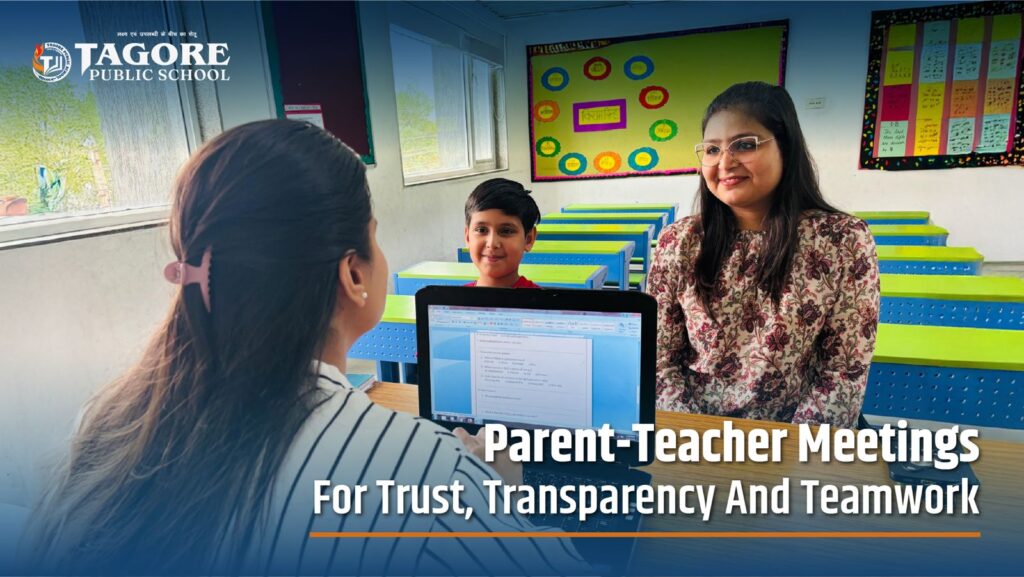Parent-Teacher Meetings, A Vital Bridge to Build Trust and Transparency

Connecting a child’s home and school life is crucial for their overall growth and development. PTMs play a pivotal role in facilitating open communication, fostering collaboration between parents and educators to ensure the child’s progress. We at Tagore Public School, Gurgaon emphasize the importance of partnership in nurturing holistic development, laying a strong foundation for academic excellence and career success. These interactions create a supportive learning environment and strengthen relationships, enabling parents and teachers to work together effectively. Let’s explore the importance of PTM and key points to consider for meaningful discussions that truly benefit students. How PTMs Drive Student Success Conferences and meetings serve as a vital platform for meaningful discussions about a student’s academic progress, behavior, and holistic development. These structured interactions foster a collaborative understanding between parents and educators, focusing on the student’s performance, strengths, areas for improvement, and social-emotional well-being. By aligning efforts, PTMs empower parents with insights to support and guide their children effectively at home, ensuring a well-rounded path to success. Strengthening Bonds Through Collaboration These meetings serve to strengthen the home-school connection, fostering a collaborative approach to a child’s education through meaningful face-to-face interactions. They provide a platform for parents and educators to exchange valuable insights and perspectives, enabling them to celebrate achievements and promptly address areas for improvement. This ensures that each child receives personalized support, paving the way for their holistic development and success. Addressing the Specific Needs of Each Child The opportunity to understand a student’s unique strengths and challenges is invaluable, and this is achieved through meaningful communication between educators and parents. These interactions provide a holistic view of a student’s academic performance, social development, and personal growth. By addressing specific challenges, educators can offer targeted support, while parents gain insight into their child’s progress in various subjects, allowing them to create a nurturing and supportive environment at home. Cultivating Motivation in Students Valuable feedback plays a crucial role in motivating students and boosting their confidence by aligning efforts between home and school, effectively addressing their areas of improvement. Teachers, by understanding the students’ home environment, are able to provide tailored attention, enhancing their ability to learn and grasp concepts more effectively. This collaborative approach makes such interactions a powerful tool for fostering motivation and instilling confidence in students. Pillars of Effective Discussions that Truly Benefit Students Valuable feedback plays a crucial role in motivating students and boosting their confidence by aligning efforts between home and school, effectively addressing their areas of improvement. Teachers, by understanding the students’ home environment, are able to provide tailored attention, enhancing their ability to learn and grasp concepts more effectively. This collaborative approach makes such interactions a powerful tool for fostering motivation and instilling confidence in students. Preparation: Teachers should regularly assess both the academic and behavioral progress of each student to identify areas for improvement. This ensures that meetings are focused, productive, and aligned with the student’s needs. Additionally, parents should come prepared with specific questions and concerns, such as, “How is my child progressing academically?” or “How can I support my child’s learning at home?” This approach fosters more insightful and effective conversations within the limited time available. Effective communication: Both parents and teachers should prioritize active listening to understand each other’s perspectives and foster mutual respect. Parents are encouraged to value teachers’ insights without resorting to blame or criticism, as this approach ensures meaningful and productive conversations. Rather than discussing unrelated gossip or matters, parents should focus on asking teachers about their child’s behavior and participation in school. This collaborative approach enables parents to support their child’s holistic development effectively. Follow Up: After the meeting, provide a clear summary of the discussion and outline actionable steps to ensure accountability and sustained support for the student. Regularly monitor progress through updates, assessing the need for adjustments as required. Teachers should also identify areas of academic weakness and dedicate additional attention to those subjects, fostering a more tailored and effective learning experience. In conclusion, these meetings serve as a vital platform for gaining valuable insights into a child’s academic progress, behavior, and overall development. These interactions foster a holistic educational approach, ensuring that efforts at home and school are seamlessly aligned. When parents and teachers collaborate effectively, students thrive both emotionally and academically. We at Tagore Public School prioritize these conferences, recognizing their pivotal role in enriching the educational experience. This commitment underscores our reputation as a top school in Gurugram. Together, let us continue to build meaningful partnerships that nurture a child’s growth, shaping them into well-rounded and capable individuals. Read More Blogs: Back to School, Forward to the Future Sun, Skills & Smiles: Summer Camp How Schools Help Mental Health Awareness TPSG’s Social Responsibility Public Speaking & Debate




